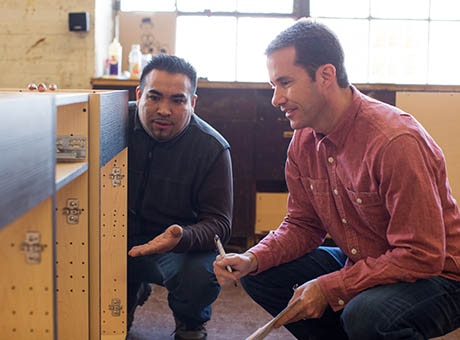Over the course of time, every private dwelling or commercial structure experiences minor cosmetic and structural issues that require attention and repair. Nuisances such as broken doorknobs or dead electrical outlets need to be fixed, but the job is often too small to draw interest from a full-fledged carpenter or electrician. If you aren’t a master of any one contracting profession, but more of a jack-of-all trades, a handyman business might be an ideal way to earn extra income or make a complete career change. The market is ripe with homeowners who would rather hire a fix-it firm than do it themselves. Before you make the leap, you must plan your approach, assess startup costs, and craft a basic marketing strategy.

How to Start a Handyman Business in Canada
Should You or Shouldn’t You?
Starting a handyman business appeals to many people who enjoy work that’s physical, but not backbreaking. A new venture requires more skills than just repair know-how. You can set your own schedule, but proficiency in allocating your time must be achieved. Balancing work life and family time becomes more of a concern, as you can spend too much time on either side of those fences. Don’t overlook the financial side. You may see the repair business as a path to financial freedom, yet a lack of money management discipline can quickly put you back in the job market. By dipping your toe in the water on weekends and evenings, part-time work may help you decide whether you’re ready to make the full-time plunge.
How Do You Get Started?
If you don’t own the necessary tools of the trade, be prepared to spend some money. Depending on your existing inventory, beefing up a tool collection may run anywhere from $500 to $10,000. Transporting ladders, power saws, and other necessities presents a challenge unless you own a reliable truck or van. Acquiring a dependable vehicle could run anywhere from $10,000 for a used model, to $25,000 or more for a new ride. You’ll also need to stay abreast of the law. Depending on the province, handymen may be required to obtain permits to perform residential or commercial work. These licences might not require huge out-of-pocket expenses, but be sure to account for them.
How Do You Get Customers?
Look for customers in two circles: personal and business. Most likely, you have a friend or relative who’ll gladly hire you to paint some woodwork or fix a leaky pipe. Word of mouth spreads fast on a job well done, and free advertising figures to be the best kind. Seek out real estate agents whose needs extend to spit and polish rather than large-scale renovations. Be reliable, and you may have some more realtors knocking on your door. Operating a handyman business won’t earn you gobs of money through big projects. You may see a steady stream of income by showing up when you say you will and being quality-driven. At some point, that weekend warrior status might blossom into a promising career.


